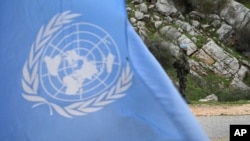After an extensive review of United Nations peacekeeping operations, an independent panel is recommending significant changes to help the world body adapt to the rapidly evolving challenges it faces in the globe's trouble spots. This is the first major peacekeeping assessment in 15 years.
The United Nations has more than 120,000 military, police and civilian peacekeepers in 16 missions across the globe. With no end in sight to many of the world’s worst crises, this number is not likely to decrease anytime soon.
The 16-member panel appointed by the U.N. chief and chaired by former Timor-Leste (East Timor) president Jose Ramos-Horta worked for seven months, looking at what the limits of peacekeeping are and what expectations should be going forward.
The panel handed the report to U.N. Secretary-General Ban Ki-moon on Tuesday morning, but it was not publicly released. Ramos-Horta spoke to reporters about its contents. He stressed that clear political goals must guide all U.N. peacekeeping operations.
"Peace is not achieved nor sustained by military or technical engagements alone. But often solutions can be found only through patient, steady political engagement," said Ramos-Horta.
He warned that U.N. missions are increasingly deployed in volatile and dangerous environments, with little or no peace to keep, and have frequently been used in the absence of a peace process. He said the panel recommends that missions should always deploy as part of a wider political process in which the U.N. plays the lead or leading role.
Ramos-Horta also called for faster deployment of missions. With no standing army of its own, it currently takes the U.N. about nine months to recruit and deploy peacekeepers.
“We call for a modest U.N. capacity to respond quickly to a crisis. For the U.N. to be able to react faster, there has to be discussions about a stronger network of first responding bridging forces from regions or individual member states," he said.
As the reach of terrorist groups spreadS, blue helmets, as the U.N. troops are known, have been caught in the middle – such as in the Golan Heights, where armed groups fighting in the Syrian conflict have abducted and attacked them, or in Mali, where they have been targeted by terrorist groups, including al-Qaida in the Islamic Maghreb, in the course of protecting civilians. The panel warned that there are real limits to what U.N. peacekeepers can successfully take on, and counter-terrorism operations is not one of them.
Sexual abuse and exploitation by peacekeepers of the people they are sent to protect has been one of the biggest stains on the United Nations. An internal report released this week said that while allegations are decreasing overall, they continue to persist. From 2008 to 2013, there were 480 such allegations, over a third of which involved a minor. Ramos-Horta said the U.N.’s "zero tolerance" policy must mean exactly that and that immunity must never mean impunity for such acts.
New York University professor and U.N. expert Richard Gowan said the report has a dual focus – improving how peacekeeping missions are managed as well as a political warning.
“Don’t push U.N. into places in North Africa and the Middle East where it will face serious terrorist groups like ISIS. Don’t imagine that the U.N. can do large-scale peace enforcement. Understand that peacekeeping is a tool that can be incredibly useful in countries like Liberia or Haiti, but still have its limits in the most dangerous environments," said Gowan.
Gowan adds that the peacekeeping review will only have real impact if member states, including the biggest ones such as the United States and China, are willing to implement the panel’s recommendations.




